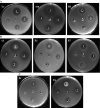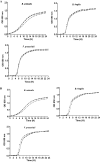Unravelling the antimicrobial action of antidepressants on gut commensal microbes
- PMID: 33087796
- PMCID: PMC7578019
- DOI: 10.1038/s41598-020-74934-9
Unravelling the antimicrobial action of antidepressants on gut commensal microbes
Abstract
Over the past decade, there has been increasing evidence highlighting the implication of the gut microbiota in a variety of brain disorders such as depression, anxiety, and schizophrenia. Studies have shown that depression affects the stability of gut microbiota, but the impact of antidepressant treatments on microbiota structure and metabolism remains underexplored. In this study, we investigated the in vitro antimicrobial activity of antidepressants from different therapeutic classes against representative strains of human gut microbiota. Six different antidepressants: phenelzine, venlafaxine, desipramine, bupropion, aripiprazole and (S)-citalopram have been tested for their antimicrobial activity against 12 commensal bacterial strains using agar well diffusion, microbroth dilution method, and colony counting. The data revealed an important antimicrobial activity (bacteriostatic or bactericidal) of different antidepressants against the tested strains, with desipramine and aripiprazole being the most inhibitory. Strains affiliating to most dominant phyla of human microbiota such as Akkermansia muciniphila, Bifidobacterium animalis and Bacteroides fragilis were significantly altered, with minimum inhibitory concentrations (MICs) ranged from 75 to 800 μg/mL. A significant reduction in bacterial viability was observed, reaching 5 logs cycle reductions with tested MICs ranged from 400 to 600 μg/mL. Our findings demonstrate that gut microbiota could be altered in response to antidepressant drugs.
Conflict of interest statement
The authors declare no competing interests.
Figures





References
Publication types
MeSH terms
Substances
Supplementary concepts
LinkOut - more resources
Full Text Sources
Other Literature Sources
Medical
Molecular Biology Databases
Miscellaneous

